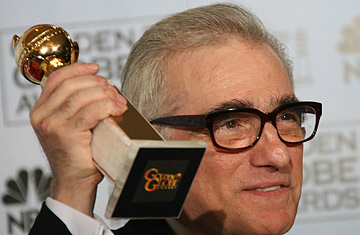
Another December at the movie theater can only mean one thing: Another deluge of sober, high-minded Oscar hopefuls (Frost/Nixon, The Reader, Doubt), all made with the aim of securing movie studios the prestige of year-end awards. (See TIME's list of the top 10 films of 2008)
The most prominent trophies are, of course, the Academy Awards,. Many, however, consider the annual Golden Globe nominations to be the official beginning of the three-month "Oscar season." On Thursday morning in Beverly Hills — at exactly 5 a.m. local time — the nominees will be announced for the 66th Annual Golden Globe Awards, serving up an ideal Christmas gift for studios that will then rush to convert the love into marketing gold.
The Golden Globes are overseen by the Hollywood Foreign Press Association (HFPA), an organization with roots dating back to the 1940s when a group of Los Angeles-based overseas writers formed to share industry contacts and information. At the time of its founding the organization was hardly a novel concept, following in the wake of both the defunct Hollywood Association of Foreign Correspondents and the Foreign Press Society. But after they dissolved, a group of journalists led by a correspondent for Britain's Daily Mail launched the HFPA in 1943. The founding motto: "Unity Without Discrimination of Religion or Race."
A year later the new group bestowed its first set of awards. During an informal ceremony at 20th Century Fox, The Song of Bernadette was named "Best Film," and its star, Jennifer Jones, "Best Actress." The following year marked the group's first gala social event, when Leo McCarey's Going My Way was named the best film of 1944. In 1950, the organization split momentarily into two competing groups — the Hollywood Foreign Correspondents Association and the Foreign Press Association of Hollywood. By the time these factions reunited as the HFPA in 1955, the Golden Globes looked very much as they do today. Honoring both movies and TV shows, dividing each category between a dramatic and a comedy/musical competition, the most recent alterations to the Golden Globes lineup occurred in 2007, with the creation of the "Best Animated Feature Film" category.
This year's nominees will reflect the judgment of 81 active voting members — journalists representing 55 countries and publications with a combined reach of more than 250 million readers. The annual awards ceremony (scheduled this season for the evening of Jan. 11) is regularly one of America's most-watched televised awards shows. But while a Golden Globe gives winning films and TV series considerable exposure to a wider audience, it is the ceremony's position on the Oscar calendar that brings the HFPA considerable influence.
Nominations for February's Academy Awards are due by 5 p.m. on Jan. 12 — less than 24 hours after the Golden Globes telecast. Some pundits speculate that a strong showing at the Golden Globes could sway Oscar voters at the last second. Case in point: last time around, the HFPA chose Atonement and Sweeney Todd: The Demon Barber of Fleet Street as the best films of the year. The former went on to receive a Best Picture Oscar nod.
Yet while the major studios hope for a boost, there are other observers who — glitz and glamour of the Globes aside — question the veracity of the HFPA. Numerous entertainment writers have challenged the group's diversity, its members' qualifications as journalists, and their attentiveness in screening every major contender. There's also the charge that the group votes based on star caliber, and not film quality — celebrating the A-list more than encouraging the B-list. The journalists may be foreign, but the agenda seems strictly Hollywood.
